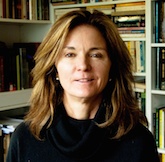Deborah Bryon PhD is a licensed psychologist and diplomate Jungian analyst, in private practice in Denver. She is a member of Inter-Regional Society of Jungian Analysts (IRSJA) and National Association for the Advancement of Psychoanalysis (NAAP). For the last decade Deborah has been working with the Andean medicine people in Peru and is the author of several articles and the books, “Lessons of the Inca Shamans: Piercing the Veil,” and “Lessons of the Inca Shamans Part 2: Beyond the Veil “(forthcoming, 2014).
Deborah received her Ph.D. in Counseling Psychology from the University of Denver, and completed her undergraduate degree in Psychology at UCLA in 1976. In addition, she holds a B.F.A. in Drawing from Metropolitan State College of Denver. Deborah is an artist member of Spark Gallery in Denver. She has taught classes in the psychology departments of the University of Colorado and Metropolitan State College of Denver. Prior to re-entering the field of psychology, she was a stockbroker on Wall Street, and started a business designing and manufacturing ladies and children’s resort wear.
Check out the following Psychology CE Courses based on listening to Shrink Rap Radio interviews:
Jungian Psychotherapy Part 1 (6 CEUs)
Jungian Psychotherapy Part 2 (7 CEUs)
Jungian Psychotherapy Part 3 (7 CEUs)
Jungian Psychotherapy Part 4 (6 CEUs)
Jungian Psychotherapy Part 5 (7 CEUs)
Jungian Psychotherapy Package of the Five Above (33 CEUs)
Wisdom of The Dream (4 CEUs)
Positive Psychology (6 CEUs)
Pros and Cons of Positive Psychology (5 CEUs)
CERTIFICATE PROGRAM IN POSITIVE PSYCHOLOGY (32 CEUs)
Body-Mind: Goodbye to Dualism (6 CEUs)
Brain: Insights from Neuroscience (8 CEUs)
Meditation & Psychotherapy (8 CEUs)
NEW! Crisis & Trauma: Identification, Assessment, & Treatment (15 CEUs)
Neuroscience and Healing (8 CEUs)
NEW! The Psychology of Relationships (7 CEUs)
Get our iPhone/Android app!
Get 10% discount on all lectures at The JungPlatform using our discount code: DRDAVE
You can also earn CEU’s by going to another partner website at Ed4Online!
A psychology podcast by David Van Nuys, Ph.D.
copyright 2014: David Van Nuys, Ph.D.
Podcast: Play in new window | Download
Subscribe: Apple Podcasts | RSS

One thing Jung and Campbell both got wrong is claiming that Westerners had to find their paths through the Western religious traditions. It may have seemed that, in the mid-20th century, many Westerners were attempting to incorporate non-Western traditions in superficial and inauthentic ways. However, I don\’t think their caution has held up in the long run. Westerners are meaningfully engaging in spiritual traditions from the East and Americas, quite without having any formal foundations in the Judeo-Christian lineage.
This is an interesting idea but I am not sure that I agree with it. I have always found both of them open to experiencing everything that could be helpful in “finding,” their paths. Jung in the eastern philosophys and Campbell by the fact that he was so versed in all mythologies.
Thanks
Just because something is possible doesn’t mean it is ethical. I tend to find these approaches pushing very close to post-colonial cultural appropriation.
Here is my goodreads review.
“I discovered this book after hearing Deborah Byron interviewed on the Shrink Rap Radio podcast. Byron courageously shares her personal journey of transformation as a former stock broker turned Jungian analyst, the odyssey that takes her to Peru to train as an Inca shaman. Byron describes her path on the edge of mental illness alongside her husband who is on a similar trajectory of mental imbalance. Byron shares her discovery of shamanic tradition and mystical experience and the painful process of integrating these discoveries back into what she refers to as her “waking life”. Byron is deeply vulnerable and sincere as she details the paradox she faces as a traditional westerner trying to integrate the spiritual knowledge she is tapping into, and the deep loneliness and alienation from traditional her culture that this entails. She fears she is going mad, and in some ways she is. Byron shares her insights into somatic perception and Jungian conceptual understandings that have allowed to make sense of her experience, but in many ways the experiences she has had translate incompletely into this cognitive framework. To be fair Byron’s work is somewhat strained, her font changes can be confusing and her narrative is somewhat scattered. However I personally enjoyed her introduction to Peruvian shamanism with the simple introductory exercises she gives in this tradition, and I found her sincere self disclosure very powerful. For me this book was valuable given my own personal experience with Inca shamanism and my own spiritual odyssey along the faultlines of consciousness and culture. This book is likely to appeal to a narrow audience, but for those intrigued with shamanism and mystical experience there is reason to check it out.”